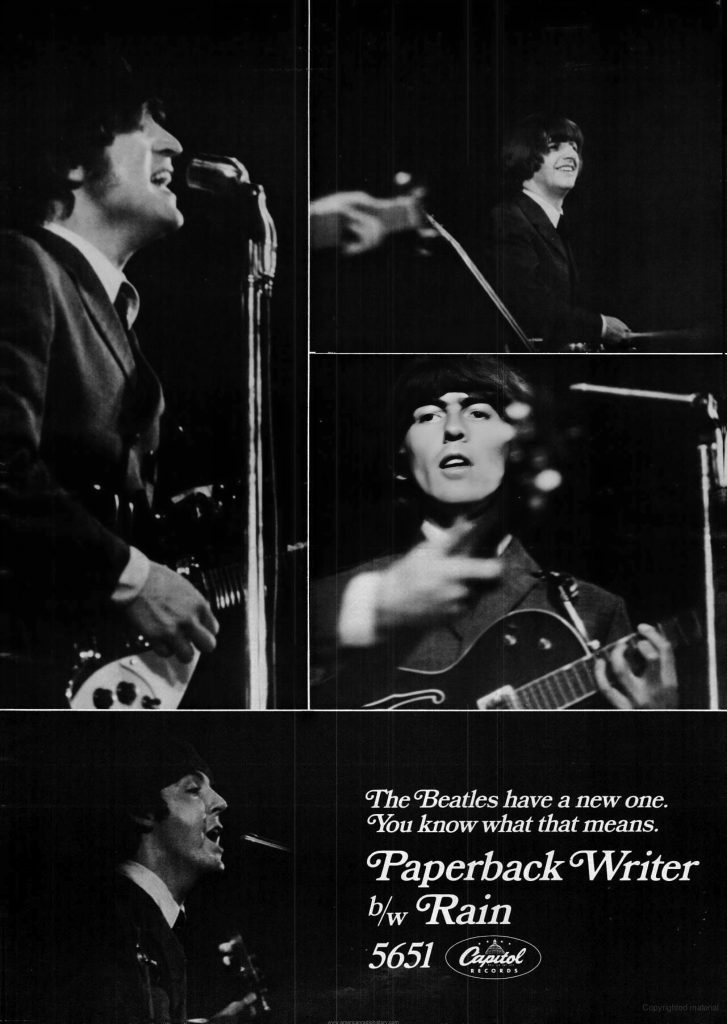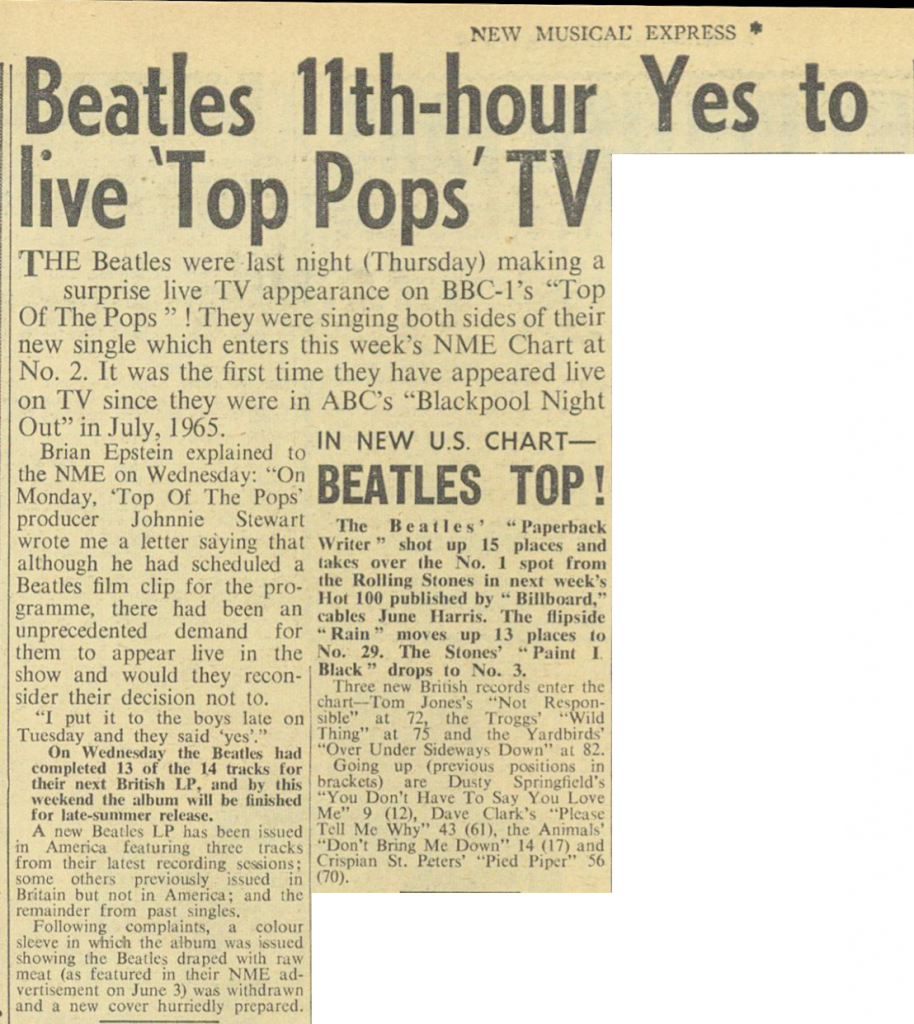US Release date : Monday, May 30, 1966
Paperback Writer / Rain (US)
By The Beatles • 7" Single • Part of the collection “The Beatles • Singles”
Last updated on October 11, 2023
US Release date : Monday, May 30, 1966
By The Beatles • 7" Single • Part of the collection “The Beatles • Singles”
Last updated on October 11, 2023
Previous single Feb 21, 1966 • "Nowhere Man / What Goes On" by The Beatles released in the US
Article May 27, 1966 • The Beatles attend Bob Dylan's concert in London
Article May 28, 1966 • The Beatles meet Bob Dylan
Single May 30, 1966 • "Paperback Writer / Rain (US)" by The Beatles released in the US
Article June 1966 • Paul McCartney moves to Cavendish Avenue, London
Article June - July 1966 ? • Designing the "Revolver" cover
Next single Jun 10, 1966 • "Paperback Writer / Rain (UK)" by The Beatles released in the UK
This album was recorded during the following studio sessions:
Recording "Love You To", "Paperback Writer"
Apr 13, 1966
Recording "Paperback Writer", "Rain"
Apr 14, 1966
Apr 16, 1966
2:28 • Studio version • A
Paul McCartney : Backing vocals, Bass, Electric guitar, Lead vocals Ringo Starr : Drums John Lennon : Backing vocals, Tambourine George Harrison : Backing vocals, Electric guitar George Martin : Producer Geoff Emerick : Recording engineer
Session Recording: Apr 13, 1966 • Studio EMI Studios, Studio Three, Abbey Road
Session Overdubs: Apr 14, 1966 • Studio EMI Studios, Studio Three, Abbey Road
Session Mixing: Apr 14, 1966 • Studio EMI Studios, Studio Three, Abbey Road
3:01 • Studio version • A
Paul McCartney : Backing vocals, Bass Ringo Starr : Drums, Tambourine John Lennon : Backing vocals, Electric guitar, Lead vocals George Harrison : Backing vocals, Electric guitar George Martin : Producer Geoff Emerick : Recording engineer
Session Recording: Apr 14, 1966 • Studio EMI Studios, Studio Three, Abbey Road
Session Overdubs: Apr 16, 1966 • Studio EMI Studios, Studio Two, Abbey Road
Session Mixing: Apr 16, 1966 • Studio EMI Studios, Studio Two, Abbey Road
From Something Else!:
[…] It had been a while since they released their previous single, “We Can Work it Out”/”Day Tripper” in December of 1965, so the band was overdue for a new one. “Paperback Writer” and “Rain” were chosen to grace the first Beatles single of 1966, and were released in the U.S.A. on May 30; the U.K. release followed on June 10. “Paperback Writer” has been considered the A-side, not surprisingly as it is the more spirited and catchy of the two. However, the picture sleeve listed it first on one side and second to “Rain” on the other. If Mark Lewisohn is the final arbiter, then the appendices for Chronicle book lists “Paperback Writer” alone in the lists for the Beatles’ Peak Singles, sandwiched between others that were listed as actual double A-sides (“We Can Work It Out”/”Day Tripper” and “Eleanor Rigby”/”Yellow Submarine”).
While the single quickly shot up both the U.K. and U.S. charts, it lasted only one week at No. 1. Lewisohn notes that it was the Beatles’ lowest-selling single since their very first, “Love Me Do.” At this point in their career, the Beatles were blazing through new trails, turning their attention to increasing the creativity of their music and recordings in light of seeing the end of exhausting and unproductive touring — and it might have take a while for the public to catch up. One can surmise that the content of these two songs caught the fickle female records-buying public by surprise, and after hearing the songs on the radio were not as interested in purchasing a single where the subjects were about a desperate job hunter and the weather – instead of, well, the girls themselves. […]

IN NEW U.S. CHART – BEATLES TOP!
The Beatles’ “Paperback Writer” shot up 15 places and takes over the No. 1 spot from the Rolling Stones in next week’s Hot 100 published by “Billboard,” cables June Harris. The flipside “Rain” moves up 13 places to No. 29. The Stones’ “Paint It Black ” drops to No. 3.
Three new British records enter the chart — Tom Jones’s “Not Responsible” at 72, the Troggs’ “Wild Thing” at 75 and the Yardbirds’ “Over Under Sideways Down” at 82.
Going up (previous positions in brackets) are Dusty Springfield’s “You Don’t Have To Say You Love Me” 9 (12), Dave Clark’s “Please Tell Me Why” 43 (61), the Animals’ “Don’t Bring Me Down” 14 (17) and Crispian St. Peters’ “Pied Piper” 56 (70).
From New Musical Express – June 17, 1966


Notice any inaccuracies on this page? Have additional insights or ideas for new content? Or just want to share your thoughts? We value your feedback! Please use the form below to get in touch with us.